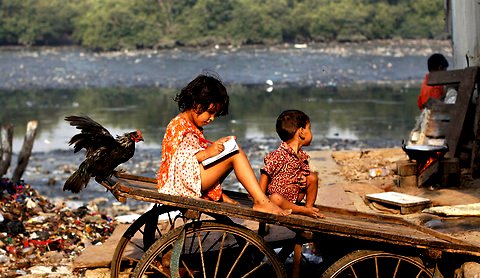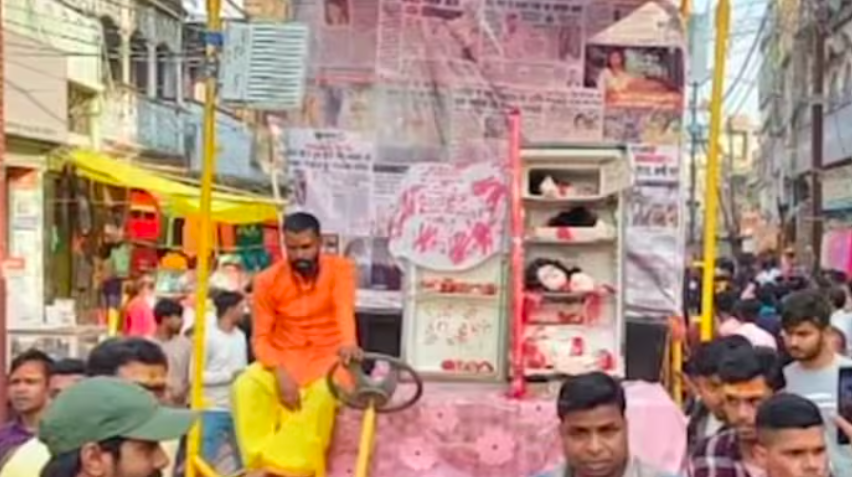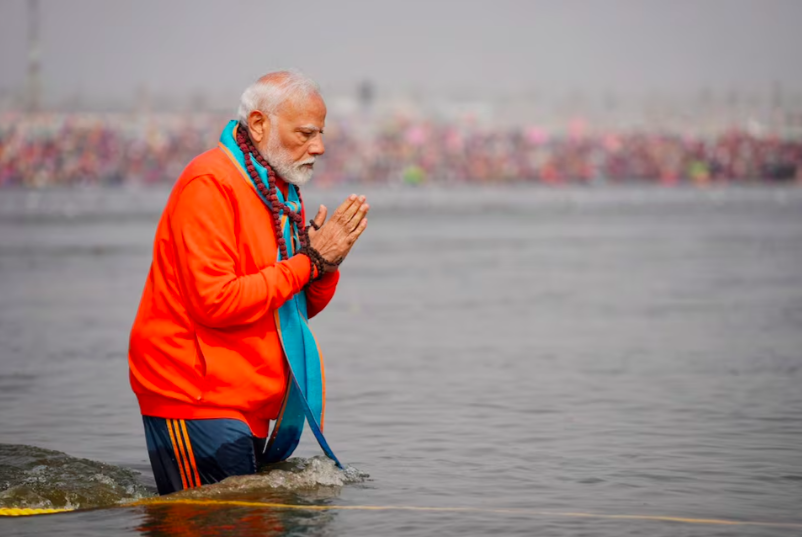Ashish Singh for BeyondHeadlines
India, a country of 1.2 billion people, has been in the news both for hunger, malnutrition in its population, and a glorious economic growth rate in the last decade.
The hunger problem has many reasons. There have been instances of mismanagement of procurement despite adequate production. These times have been few and can be offset by imports and in other periods the distribution and access to food for everyone. Since food is arguably one of the foremost basic needs, it is of utmost importance for the Indian government and policy makers to ensure that nobody sleeps hungry. In September, 2013 the parliament of India passed a law that makes right to food a legal entitlement. In the current scenario and given the way poverty is measured, this law will benefit approximately 800 million people which are about 67 percent of India’s population.
 The World Bank defines a poor person as someone living on less than 1.5 USD a day. India undoubtedly is the home of one the largest group of poor people in the world. Even by the Indian national poverty standards 29.8 % people live below the poverty line. However, international reports portray an even grimmer picture. The United Nations reported in 2013 that one third of the world’s poor live in India. That should not be a surprise; given that 400 million people live on less than 1.5 USD a day and 841 million live on less than 2 USD a day. This new bill will affect the lives of a large number of the world’s poor.
The World Bank defines a poor person as someone living on less than 1.5 USD a day. India undoubtedly is the home of one the largest group of poor people in the world. Even by the Indian national poverty standards 29.8 % people live below the poverty line. However, international reports portray an even grimmer picture. The United Nations reported in 2013 that one third of the world’s poor live in India. That should not be a surprise; given that 400 million people live on less than 1.5 USD a day and 841 million live on less than 2 USD a day. This new bill will affect the lives of a large number of the world’s poor.
The National Food Security Bill when implemented will provide subsidised food grains- wheat, rice and coarse cereals for Rs.3, 2, 1 respectively. Each family will be entitled to get 5 kg of food grains per person per head every month from the government fair priced shops. The task of identifying eligible households has been left to the states. The central government will provide funds to states in case of short supply of food grain. The current food grain allocation of the states will be protected by the central government. The state governments will provide food security allowance to the beneficiaries in case of non-supply of food grain. The eldest woman in the household, 18 years or above will be the head of the household for the issue of the ration card. Every pregnant woman and lactating mother will be entitled to free meals during pregnancy till six months after child birth. They will also get a maternity benefit of 6,000Rs. in instalments. Children up to 14 years will get free meals (through the existing mid-day meal scheme at school).. To strengthen the distribution system, the act directs the state governments to computerize the process end-to-end to ensure transparency. This in turn should also bring in more accountability and facilitate smoother movement of food to different areas according to demand. It also aims to empower women, by making them the head of family in the ration cards, as well as providing guidelines for creation of a robust grievance redressal mechanism and bring in more transparency by making it obligatory for authorities to make the documents pertaining to the targeted population available in the public domain, to ensure that non-state actors do not deprive other individuals and groups their access to adequate food. The schedule includes details on nutrient contents required for children and pregnant women.
There had been some criticism given the wide scope of this act and previous bad experiences in poor implementation of different government schemes. Questions have been raised regarding the possibilities of making the scheme universal instead of targeting a certain percentage of the population, since the definition and measurement of poverty are disputed and have changed many people’s status overnight, on paper.
According to social activists Aruna Roy and Inayat Sabhikhi, “considering that this bill has emerged from a Public Interest Litigation filed over excess grain rotting in go-downs, the National Food Security Bill (NFSB) seeks to address some serious issues in the country related to food security.”
Furthermore, they explain that the NFSB as envisioned in its earlier form was intended to end hunger by providing genuine food security via reforming the public distribution system, universal maternity benefits, community kitchens, pensions and so on. But the Bill that was passed recently by both the houses of parliament, is a skeleton of the earlier proposed Bill, says the duo.
Nonetheless there are major breakthroughs that are welcome. For one, it de-links entitlements from the ineffective Below Poverty Line (BPL) lists and links it to population coverage instead. Both Roy and Shabhiki agree that the universal maternity benefits constitute an enormous progressive step given the historic discrimination and low priority given to women’s nutrition.
The big victory with this legislation is also the acknowledgment of the prevalence of hunger and widespread malnutrition. This picture of a hungry India does not fit into the recent growth story narratives of the country. Instead of being a source of embarrassment to be denied, it is now accepted and attempts are being made to reform the situation. Roy and Sabhikhi add further that “the process of identifying beneficiaries and rolling out the coming months will be crucial to the success of the scheme. There are already several measures in place. The Socio Economic Caste Census is to be used as a criterion for identification. There is more clarity than is apparent but states will have to use as pro-active and inclusive an approach while identifying beneficiaries.”
On one hand, the United Progressive Alliance government is positive about the bill. “If we don’t have resources, we will have to create them. This bill has come into force to provide minimum basic security to everybody. In future if we have more resources, we will provide more,” says Rashid Alvi, Spokesperson of the Indian National Congress.
On the other hand, Aruna Roy and Inayat Sabhikhi demand a universal scheme rather than a targeted one. “There is documented evidence from different schemes where universalisation has shown results better than targeted efforts. Tamil Nadu has a universal PDS with an excellent track record. Other states like Chhattisgarh too have a near universal PDS. These States have been able to achieve this with significant political will and supplementing central provisions with their own state resources. By lowering the price of grain and increasing coverage, vested parties also have an interest in making the PDS work.”
Giving the example of a previous scheme for right to work, both of the activists are supportive of Universalisation of all social security schemes. They write that “in the state of Rajasthan, the norms have been changed from Below Poverty Line as an eligibility criterion. It is now universal with certain clear exclusion norms (organised sector pension, income above a certain level etc.) Given the tendencies of the state to exclude, a principle of universalisation of all social security schemes is preferable.”
The current bill has also been criticized by several economists and media professionals on the grounds that it will be very difficult for the government to provide sufficient finances for the implementation of this bill. Roy and Sabhikhi say that “there is evidence that a population with capabilities will be far better poised to reap the benefits of growth. If not, increase in growth and output will only continue to disproportionately benefit a minority. The process of forming budgets and weighing in priorities from different sections of the population is the prerogative of the Government. Given democratic politics, it is essential that they respond to people’s needs. Figures on malnutrition, hunger, migration, childbirth deaths etc. are revealing in a way that the amplified concerns of a vocal powerful elite can never be.”
She adds that the Indian Members of Parliament also have to answer to the large section of the poor who have elected them and who have watched the rich benefit from years of eight per cent growth, while millions of others are still unsure of their next meal. The need for food security in India is are a tangible concern.
The Government of India, whether it is the ruling alliance or the opposition thanks to democratic politics will thus ensure that the financial implications of the Bill are met with.”
Sonia Gandhi, the president of the Indian National Congress and the chairperson for UPA responded, “It is not a question of whether we can afford to pass this bill, but whether we can afford not to”
There are several challenges this bill will have to face in order to feed such a large percentage of the population. Effective implementation will also depend of pro-activeness of the states. However, if well implemented, its impact on poverty will be vast and visible.
(Author is affiliated with Oslo university college, Norway)









